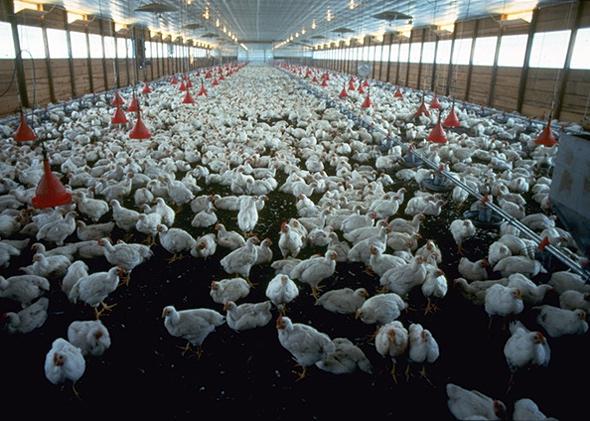Industrial Farming: Tyson, US Poultry Giant Using Land 'Twice The Size Of NJ' For Animal Feed, Study

- The Guardian, Feb. 9, 2022. - Industrial farming: research by the Union of Concerned Scientists estimates huge amounts of land being used for feed crops. -
Tyson Foods utilizes between nine and 10m acres of farmland – an area almost twice the size of New Jersey – to produce corn and soybeans to feed the more than 2 billion animals it processes every year in the US alone, according to new research. The study by the Union of Concerned Scientists (UCS) published on Wednesday also estimates that only about 5% of this land, 408,000 acres, has been enrolled in sustainable farming programs announced by Tyson in 2018.
The UCS findings are based on calculations of the amount of corn and soybeans Tyson required to feed the approximately 6 million head of cattle, 22 million hogs and nearly 2 billion chickens it processed in the US in 2020, drawing on data reported by Tyson. Industrial farming: research indicates Tyson's feed crops use farmland almost twice the size of New Jersey (SEE Image). A Union of Concerned Scientists estimate of the acres of feed crop in Tyson’s supply chain in 2020:
Most consumers do not appreciate how much land is needed exclusively to support industrial animal farming and the wider environmental impacts of that, said Marcia DeLonge, a senior scientist in the food and environment program at the UCS and co-author of the report. “We are using this land in a way that creates a lot of pollution and a lot of problems that contribute to climate change,” DeLonge said.
Tyson Foods did not respond to requests to comment on the UCS research and questions about its crop feed footprint.
Gidon Eshel, research professor of Environmental Physics at Bard College, said the scale of farming needed to produce animal feed contributes to many of the environmental problems of large-scale agriculture. These issues include changes to soil and the natural flow of water, the way solar energy relates to the earth, and disruption of plants and animals. Pollution from fertilizers and pesticides are another big concern, and the risks of contaminating drinking water and harming ecosystems...
https://www.theguardian.com/environment/2022/feb/09/us-poultry-giant-tyson-farmland-twice-size-new-jersey-feed-animals

